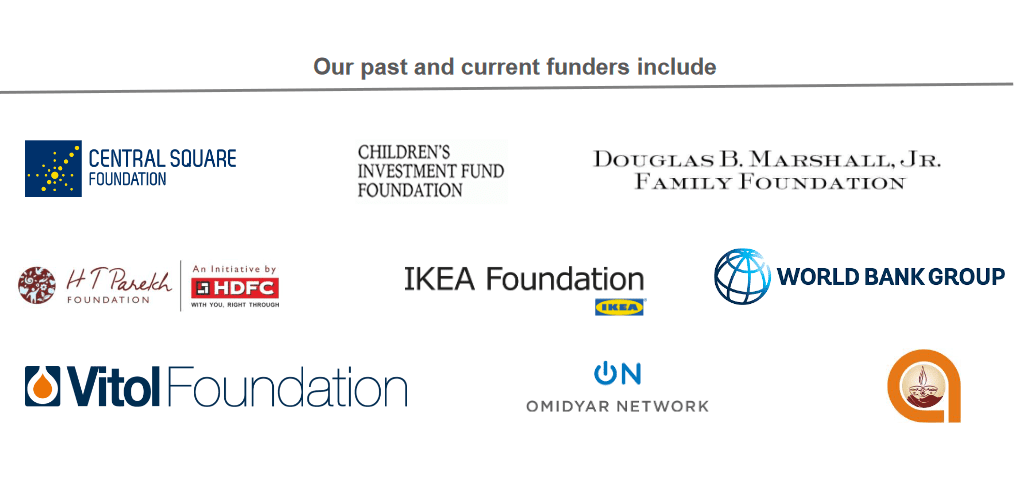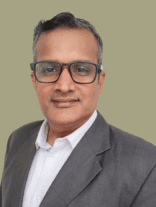Program to Improve Private Early Education (PIPE)
Rote teaching leads to poor learning outcomes for children in the foundational years
54 percent of children in South Asia are enrolled in private schools. Families with low-income, that constitute 70 percent of urban India, prefer to send their children to affordable private schools (APSs) as they believe private schools provide better English language education than government schools. APSs are schools that charge fees of less than USD 356 per annum, and typically provide education up to grade 10. Unfortunately, learning outcomes are poor. Only 1 out of 5 children in grade 1 in APSs can read simple words like “sat,” “pin,” or “mug.” A key reason for these poor learning outcomes is rote teaching. Rote teaches children to repeat letters and numbers but does not provide critical pre-literacy, pre-numeracy, and executive function skills.
PIPE aims to replace rote with activity-based learning in all 300,000 affordable private schools in India
Activity-based learning (ABL) uses structured play-based activities, games, and experiences that provide developmental benefits across the cognitive, physical, and social-emotional domains. Evidence shows that ABL in early education can build a solid foundation for lifelong learning. Therefore, PIPE aims to replace rote with ABL in all 300,000 APSs in India. The adoption of ABL in APSs faces supply, quality and demand barriers. PIPE aims to address these barriers and achieve four goals. Achieving these goals will create a healthy and unsubsidized market for ABL solutions that continues to scale even after PIPE ends. By 2025, PIPE aims to:
- Scale supply of high quality, affordable ABL solutions in the APS market with at least 3 ABL solution providers profitably serving more than 500 APSs each
- Improve quality of ABL implementation in APSs leading to 50 percent better learning outcomes across numeracy, early language skills, executive function, motor skills, and socio-emotional skills
- Shape demand for ABL such that 15 percent of APSs adopt ABL in one tier-1 city
- Raise awareness about the need to focus on early education and the APS market
To date, more than 150,000 children in PIPE APSs have gained access to ABL and children in PIPE APSs have shown improved learning compared to their peers in schools with no ABL
PIPE has signed up 9 ABL solution providers (“partners”) to provide high-quality, affordable ABL solutions (i.e., curriculum, teacher training and stakeholder education) to APSs profitably. PIPE supports its partners through interventions like developing and implementing profitable business models, embedding best practices to address barriers, adapting product to the APS market, and disseminating content to highlight benefits of ABL. PIPEs partners include Chippersage, Chrysalis, Hippocampus, Karadi Path, Kreedo, Next Education, Vikalp, Gyanshala, and 321 Foundation. As of 2023, PIPE partners have provided ABL to over 750 APSs serving approximately 150,000 children from families with low-income. A recent assessment showed that within PIPE APSs, Sr. KG children responding correctly to literacy and numeracy questions increased by 33% since 2018.
Since 2015, FSG has worked closely with APS administrators, teachers, parents, and ABL solution providers to understand the Indian APS market and publish best practices to scale ABL solutions in the APS market.
FSG’s philosophy, which was to work with existing stakeholders in the system and create a financially sustainable model, gives me confidence that PIPE’s impact and momentum will sustain.
If I call out the most important milestones of my business, collaborating with FSG would be high on the list. It’s really brought in rigor in our research and has helped renew our thinking. Today, we are able to address the needs of affordable private school segment through contextualized offerings.
Resources and Impact
- The Indian APS landscape
Insights from primary research with 4,400 low-income families, 40 APS administrators, 40 APS teachers, and over 167 education companies - Best practices and tools to serve the APS market
Best practices for ABL solution providers to enter, scale and effectively deliver in the APS market - Impact of PIPE’s intervention
Impact and sustainability of PIPE’s intervention on education quality in PIPE APSs and the APS system
Meet the Team


